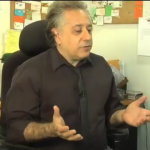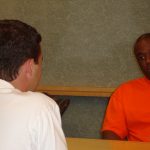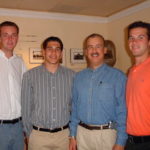Chris Wooddell was living off the land in Alaska at 22 and then became interested in science after having that one person, in this case a plant taxonomist, really inspire her to go in a certain direction. Now she’s got a PhD and is a medical researcher doing some highly advanced stuff with muscular dystrophy.
Interview: How To Become a Medical Scientist
As a researcher, you have a million topics you could research. But what’s your motivation to research this area?
Well, it mainly has to do with how can you deliver the gene. When I started I was hired to develop a way to treat diseases that originated in the liver. Like Hemophilia. My area is transcription genetic expression. So we know the gene, but you actually have to put lots of different elements on a GMA to make that gene get used by the cells. So you have to put all the right sequences on it. That’s called gene regulation. Because the gene alone is just codes for the protein. But it won’t do anything by itself. You have to put signals on it that tells the body to make the protein. That’s what I do.
But personally though, why are you doing this? Why research this and spend 40, 60 hour weeks on researching this?
Well, it’s fun. It’s very exciting. You’re trying to do something no one has done. It has the potential to be really helpful to people. There are just so many people with genetic diseases. So many people who are hemophiliacs and those kind of things. It’d be really great to be able to contribute to making them better. So there’s that aspect of it.
The other aspect of it is, as far as gene regulation goes, it’s exciting the idea of knowing you have this gene in here. And it used to be that you put it into the mouse, and the first day there’s a lot of expression. It makes a lot of the clotting factor if you’re doing hemophilia. But then it just, ‘BOOM!’ It drops a thousand fold in a week and it doesn’t help anybody. That’s not enough.
So I was hired to make something that would make expression go high level for a long time. You know, it’s an exciting problem. Can we do this? This could be very useful. That’s what I was hired to do, and I did. Now that basically can’t go forward until we figure out a way to deliver the genes to the liver and people. So we can do it in mice, but it involves injecting the tail vein with a large volume and it’s not a method we can use in people.
When you were my age, did you picture yourself doing this?
No. When I was your age I was trying to homestead in Alaska (laughs). It failed miserably. No, I didn’t even think about science. I started going to college when I was 25 and I already had kids. It took me a long time to get through my undergraduate degree because I had kids and I had to work. I was a waitress for a long time.
But I had a professor who was a plant taxonomist. He made it sound so exciting about the things that were inside plants. Why did plants make interesting things like why does a vanilla bean make something that smells so good? All these interesting characteristics inside of the plant. I thought I’d like to know the chemistry inside of the plants. How does that happen?
I eventually learned that that term would be called molecular biology. Then I needed a job and I got one in this professors lab who was a neurobiologist. A molecular neurobiologist. So I went from plants to people. And I just kind of came this way.
When I finished my PhD I was looking for a job and I thought I’d really like to do something that will help people get better who are suffering from something. And I wanted to do something exciting. Research is really fun. It’s like this wild roller coaster ride. If you design an experiment well, you get information. And every little step you move forward toward the goal. And you get closer.
Is it exciting on a daily basis? Or are there droughts of time where nothing really happens and you have to deal with the same problem over and over again.
I think it’s exciting a lot of the time. Although, mainly what I’m doing now is I’m writing a lot of reports. Because there are a number of people who work on this project, and I’m the leader. I get the information from the people and I do a lot of analysis to see what the information says. It’s surprising how often the secrets are in the little details. All the things you might ignore. Like an experiment worked in a strange way this time, and why did that happen? You might just say, ‘Oh well. That was for whatever reason and you’ll throw it out.’ But actually, that’s where you find some secrets on what to do next. What could be the answer. In fact, John Wolfe, the founder of the company, the first time he discovered you could inject somebody with the gene using a circular piece of DNA that has the gene with control elements, he just injected it into the muscle. It was supposed to be a negative control because he was using a viral vector that would get the gene in. And it worked! It’s like, ‘Whoa! We didn’t think that was going to work.’ That’s how it all started, and it’s developed since then. If that worked, let’s try injecting it into a vein. Then it progressed from there.
So I’m sorry, Alaska, 22, doing what?
Trying to live off the land. That didn’t go very well.
A communal thing with other people?
Well I was married with my husband. But it was a big disaster. Things don’t grow that well up there. It was a lot of winter.
So if you could go back and tell your 22 year old self one piece of advice, what would you say?
Well, I think it’s important to pursue what excites you. I wasn’t ready to go to college when I was 18. I was just overwhelmed with the world. I suppose I could have gone back sooner than 25, but I guess my main piece of advice was for people to finish your education before you start having kids because it really complicates it. It really slows things down.
But otherwise, I think it’s just good to take classes in whatever seems interesting. Whatever class is most interesting, you go that way. You take more classes like that.
It sounded like your teacher’s enthusiasm stimulated your interest.
Yeah. There were two of them. One of them was an organic chemistry professor, believe it or not. Most people think organic chemistry is so boring, but this guy was a wiry little guy who was so full of energy and made you feel alive when one molecule wants to interact with the other one. That just very passionate approach to understanding life did a lot for me. That professor, and then the plant taxonomist. They really inspired me and lit a fire way back when. The only time I started thinking, ‘Whoa. Maybe I don’t really like this’ is when I transferred to the University of California. This was in Louisiana when I started school. And then I transferred to UC Santa Barbara and at first I had all of these teachers who were really dull. It wasn’t very interesting. And I thought, ‘Wow. I like this, but maybe I don’t like this.’ And then there was this guy who was a good teacher who talked about something exciting again and I realized I did like it after that.






